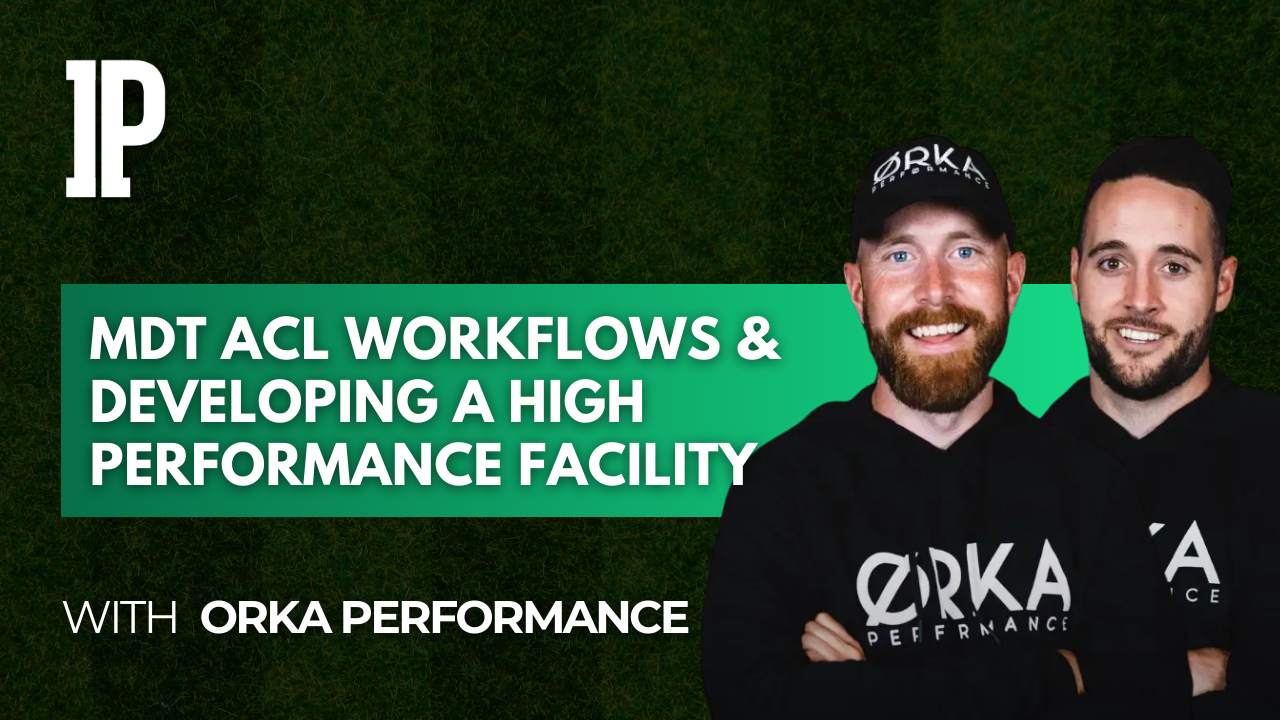MDT ACL Workflows & Developing a High Performance Facility 4 days ago
May 01, 2025
Episode 185: In this episode of the Inform Performance Podcast, hosted by Andy McDonald, we’re joined by Travis Gaudet and Taylor Evernden — two leaders in integrated rehab and performance systems.
Travis is a highly credentialed physiotherapist with a Master’s from Dalhousie University, a Fellowship with the Canadian Academy of Manipulative Physiotherapists (FCAMPT), and advanced certifications in IMS, acupuncture, diagnostic imaging, and manual therapy techniques. His work focuses on evidence-based rehab, injury reduction, and leveraging sport science analytics to help athletes truly return to performance.
Taylor is a Strength and Conditioning Coach and founder of ORKA Performance, with over a decade of elite-level coaching experience across the Premier League, NHL, MLS, CFL, and more. Holding a Master’s in Strength and Conditioning from Edith Cowan University, Taylor brings a high-performance, sport-specific lens to athlete development and is also a coach educator with Canada Soccer.
Topics Discussed:
- Introduction to ORKA Performance and the founders’ backgrounds
- Their ACL rehabilitation process and overall philosophy
- Key phases of ACL rehab and metrics used to monitor progress
- How they are revolutionizing traditional rehab protocols
- The critical importance of objective testing in return-to-performance decisions
- Navigating the unique challenges of the Canadian rehab landscape
- Building a standout strength and conditioning model for post-rehab success
- Major lessons learned from years of clinical and performance practice
Tune in for a deep dive into next-generation rehab and performance strategies that bridge science, therapy, and coaching to build resilient, elite athletes.
Key Points
-
The ACL rehab process is initiated with a discovery call designed to establish mutual expectations and determine if the athlete-provider fit is appropriate. This approach is not only about clinical assessment but also about setting the stage for communication and trust, which are essential for long-term adherence and successful outcomes. The discovery call helps clarify the journey ahead, addresses potential objections early, and ensures both parties are aligned on the commitment required for optimal rehabilitation.
-
Following the discovery call, a comprehensive 60-minute one-on-one assessment is conducted with a physiotherapist. This session thoroughly evaluates the athlete’s surgical and injury history, current function, and specific goals. The assessment is structured to map out the entire rehab journey from day one through to return to sport, providing the athlete with a clear understanding of the phases, expected timelines, and criteria for progression, which supports both motivation and compliance throughout the process.
-
Early post-operative care emphasizes restoring knee extension, reducing swelling, and regaining range of motion. Athletes are encouraged to attend one to two physiotherapy sessions per week, supplemented by daily home exercises. The initial focus is on pain management and functional restoration, with individualized adjustments based on surgical protocols and the athlete’s specific presentation, ensuring a tailored approach that respects tissue healing timelines and personal recovery rates.
-
Athletes have the option to engage in either one-on-one rehabilitation sessions or a membership-based small group rehab model. The group setting, supervised by physiotherapists, offers a cost-effective alternative to individual care while fostering a sense of community. This community aspect is particularly valuable for athletes who may experience a loss of identity or social support due to their injury, as it helps maintain motivation and mental well-being during the lengthy rehab process.
-
The rehabilitation pathway is divided into five distinct phases, each with clearly defined entrance and exit criteria. Progression through these phases is contingent upon achieving objective testing benchmarks, such as strength, range of motion, and functional performance measures. This structured approach ensures that athletes advance only when they are clinically ready, reducing the risk of re-injury and optimizing long-term outcomes.
-
Objective testing and criteria-based progression are central to the program, with regular assessments guiding decision-making at each stage. Testing includes strength symmetry (often using isokinetic or handheld dynamometry), hop tests, and movement quality evaluations. These data-driven checkpoints provide transparency for athletes and clinicians, supporting informed progression and facilitating communication with other stakeholders such as coaches and medical teams.
-
The transition from rehabilitation to performance training is deliberately integrated into the process. As athletes approach mid-to-late stage rehab, they begin working with strength and conditioning coaches to bridge the gap between clinical recovery and sport-specific performance demands. This collaboration ensures that return-to-play decisions are based on both medical and performance criteria, minimizing the risk of reinjury and supporting a successful return to competitive sport.
-
Recognizing the high dropout rate from ACL rehab around the three-month mark, the program places particular emphasis on athlete education and ongoing engagement. Continuous communication, regular goal-setting, and involvement in a supportive community are leveraged to maintain motivation and adherence beyond the initial recovery phase, which is critical for achieving full functional restoration and safe return to sport.
-
The mental health and psychosocial aspects of ACL rehabilitation are explicitly addressed through both individual and group interventions. Athletes are supported in managing the psychological challenges of long-term rehab, such as anxiety, loss of identity, and fear of reinjury. The group model, in particular, provides peer support and shared experiences, which have been shown to enhance resilience and overall rehabilitation outcomes.
-
The entire rehabilitation process is underpinned by a philosophy of continuous evolution and outcome-driven care. Systems and protocols are regularly reviewed and refined based on emerging evidence, athlete feedback, and clinical outcomes. This commitment to ongoing improvement ensures that the rehab program remains at the forefront of best practice, delivering elite-level care to athletes across all levels of sport.
Where you can find Travis and Taylor:
Sponsors
VALD Performance, makers of the Nordbord, Forceframe, ForeDecks and HumanTrak. VALD Performance systems are built with the high-performance practitioner in mind, translating traditionally lab-based technologies into engaging, quick, easy-to-use tools for daily testing, monitoring and training
Hytro: The world’s leading Blood Flow Restriction (BFR) wearable, designed to accelerate recovery and maximise athletic potential using Hytro BFR for Professional Sport.




